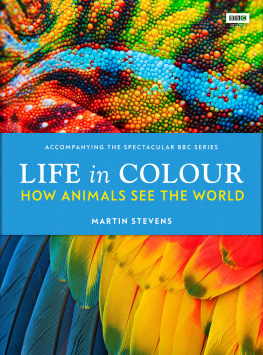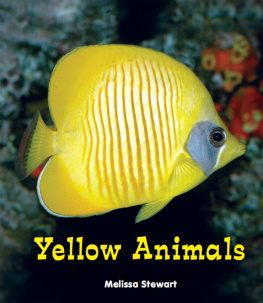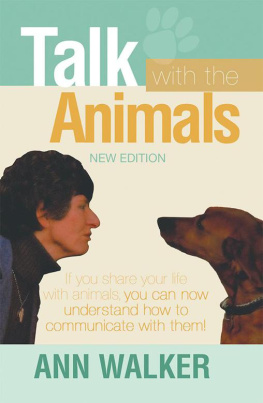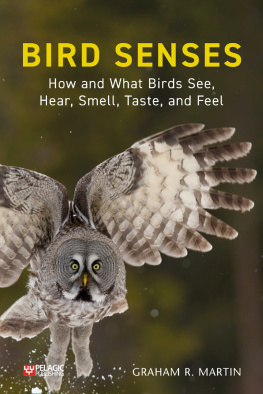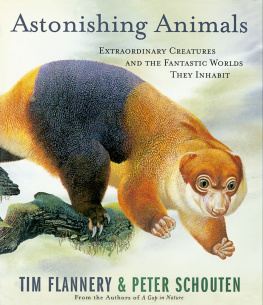Secret Worlds

Great Clarendon Street, Oxford, ox 2 6 dp , United Kingdom
Oxford University Press is a department of the University of Oxford. It furthers the Universitys objective of excellence in research, scholarship, and education by publishing worldwide. Oxford is a registered trade mark of Oxford University Press in the UK and in certain other countries
Martin Stevens 2021
The moral rights of the author have been asserted
First Edition published in 2021
Impression: 1
All rights reserved. No part of this publication may be reproduced, stored in a retrieval system, or transmitted, in any form or by any means, without the prior permission in writing of Oxford University Press, or as expressly permitted by law, by licence or under terms agreed with the appropriate reprographics rights organization. Enquiries concerning reproduction outside the scope of the above should be sent to the Rights Department, Oxford University Press, at the address above
You must not circulate this work in any other form and you must impose this same condition on any acquirer
Published in the United States of America by Oxford University Press
198 Madison Avenue, New York, NY 10016, United States of America
British Library Cataloguing in Publication Data
Data available
Library of Congress Control Number: 2021934078
ISBN 9780198813675
ebook ISBN 9780192543134
Printed and bound by
CPI Group (UK) Ltd, Croydon, cr0 4yy
Links to third party websites are provided by Oxford in good faith and for information only. Oxford disclaims any responsibility for the materials contained in any third party website referenced in this work.
For Lenny, Sam, and Audrey
Preface
The philosopher Thomas Nagel once posed the question What is it like to be a bat? in a thought experiment about perception and consciousness. In doing so, he was really asking questions about what consciousness means, but we might equally pose the same question to think about what the sensory world of a bat is like and how that governs its life. It is easy to fall into the trap of assuming that other animals perceive the world in the same way that we do, but the reality could hardly be more different, or exciting. What we perceive are but snapshots of the physical world, measured and interpreted by our senses and our brain. The product of our evolutionary past, our senses only allow us to perceive those aspects of the world for which we have the necessary apparatus, used to gather the information we needed to survive.
Far from being uniform across species, how an animal perceives the world is heavily dependent on its sensory systems and brain. In the case of bats, many species have a highly sophisticated ability to use echolocation to navigate and hunt for prey. This is centred on ultrasonic frequencies that operate well above our hearing range. Our ears are simply not tuned to detect these frequencies. Each animals perception of the world is therefore a product of its sensory systems, and the information detected can differ greatly from other species.
Its worth pausing for a moment to consider how crucial our senses are to everything we do. Vision, smell, taste, hearing, and touch all provide us with an essential ability to respond to threats, communicate with one another, perform numerous daily tasks, avoid obstacles, and interact appropriately with the world around us. To people who have lost just one of their main senses, such as vision, many tasks the rest of us take for granted can be challenging. So, imagine what life would be like if we lost our vision, our hearing, our smell and taste, our touch, and so on. Our senses provide a critical gateway to the outside world, allowing us to interact with it. The same is true for all animalstheir sensory systems are what enables them to forage, avoid predators, attract mates, navigate, and much more. Without them, individuals would be completely helpless.
Human senses do a reasonable job of allowing us to gather information from the world and behave accordingly. But throughout this book we will encounter many animals with senses that, in comparison to ours, seem extremely refined. By contrast, we are more of a jack of many trades, with a range of good but not spectacular senses. I say many rather than all trades because we lack entirely some sensory systems that other animals possess. Ultimately, the sensory systems of other animals are tuned to widely different stimuli. For example, many animals, from spiders to birds, can detect and respond to ultraviolet light, to which we are blind. Others, including numerous insects, rodents, and bats, can hear high-frequency ultrasonic sounds well beyond our own hearing range.


